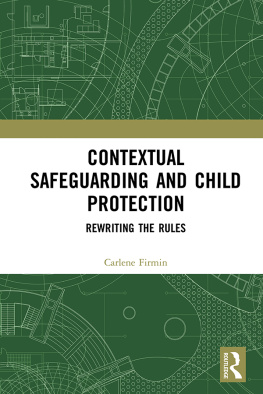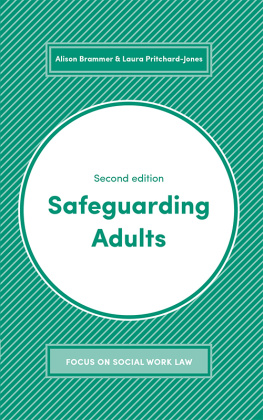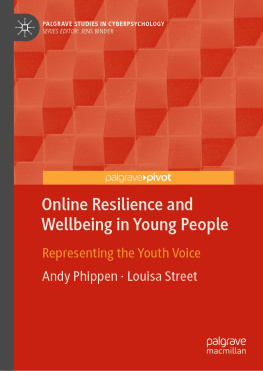

First published in Great Britain in 2018 by
Policy Press University of Bristol 1-9 Old Park Hill Bristol BS2 8BB UK Tel +44 (0)117 954 5940 e-mail
North American office: Policy Press c/o The University of Chicago Press 1427 East 60th Street Chicago, IL 60637, USA t: +1 773 702 7700 f: +1 773-702-9756 e:
Policy Press 2018
British Library Cataloguing in Publication Data
A catalogue record for this book is available from the British Library
Library of Congress Cataloging-in-Publication Data
A catalog record for this book has been requested
ISBN 978-1-4473-3182-7 paperback
ISBN 978-1-4473-3184-1 ePub
ISBN 978-1-4473-3185-8 Mobi
ISBN 978-1-4473-3183-4 ePdf
The right of Claudia Megele to be identified as author of this work has been asserted by her in accordance with the Copyright, Designs and Patents Act 1988.
All rights reserved: no part of this publication may be reproduced, stored in a retrieval system, or transmitted in any form or by any means, electronic, mechanical, photocopying, recording, or otherwise without the prior permission of Policy Press.
The statements and opinions contained within this publication are solely those of the author and not of the University of Bristol or Policy Press. The University of Bristol and Policy Press disclaim responsibility for any injury to persons or property resulting from any material published in this publication.
Policy Press works to counter discrimination on grounds of gender, race, disability, age and sexuality.
Cover design by Policy Press
Front cover image istock
Readers Guide
This book has been optimised for PDA.
Tables may have been presented to accommodate this devices limitations.
Image presentation is limited by this devices limitations.
Contents
Claudia Megele is the Head of Service for Quality Assurance and Principal Social Worker at Wiltshire Council, and a fellow of National Institute of Health Research (NIHR). Claudia is a practitioner, researcher and digital scholar with over 20 years of experience across academia, research and practice. She is a leader in holistic safeguarding (i.e. safeguarding both online and offline), digital professionalism and digital citizenship and ethics, as well as psychosocial and relationship-based practice. Her work includes over a decade of social media research, practice and leadership. Her research is specifically focused on psychosocial understanding of digital and social media and their impact on identity, safeguarding, relationships, professionalism and wellbeing.
Peter Buzzi is an international consultant with extensive experience in innovation and large transformation projects in Japan, Europe, the UK and the US.
The internet is an extraordinary force for good but it is not designed with children in mind. Now more than ever, the internet offers children unlimited opportunities to learn, to explore and to engage with others and this critical part of their lives will only continue to grow. With this rapid progression however, more parents and carers are feeling increasingly out of their depth and unsure about the impact this digital engagement is having on the lives of children.
Increasingly children inhabit a world dominated by near constant social engagement through digital means. They are growing up in a world of selfies and likes where they wield the power to communicate globally. Given childrens extensive online engagement, more needs to be done to prepare them for the risks that they might face online and to ensure that the digital space in which they interact is as supportive as possible.
Offline, adults aim not just to educate their children as they grow up, but to help them develop resilience and the ability to interact critically with the world; recognising that without these softer skills, they cannot grow up as enabled agents and citizens to lead healthy, rewarding and productive lives. Given the impact and importance of digital technologies in everyday life, the same level of care, attention and importance should be given to childrens online education and digital resilience. This book enables anyone working with children to do so while ensuring children and young peoples safety and wellbeing both online and offline.
This book is unique in its approach as it encourages parents, carers, social workers and other safeguarding professionals as well as all adults working with children or involved in safeguarding them, to consider online risks in a critical and systematic manner and in the context of enhancing childrens digital media knowledge and skills and digital citizenship. Too many approaches have previously favoured restrictive measures that either limit childrens digital opportunities and growth or aim to prevent them from accessing the internet or a smartphone. It is important to recognise that these approaches are inadequate and often when these methods are employed, children continue their risk-taking behaviour without adult supervision exposing them to added risks while the opportunity for positive digital engagement and learning is lost. Rather than safeguarding young people, this disadvantages them as they experience less digital engagement, poorer digital literacy and therefore increased vulnerability to online risks.
This is perhaps most acute for looked after children whose social workers, foster parents or carers are often daunted by the prospect of online risks and digital safeguarding when social media seems unlimited, how do you prevent inappropriate contact? This book addresses that critical question among others and provides a way of understanding and thinking about risk that enhances a childs digital rights and citizenship while still mitigating online risks.
As Childrens Commissioner, I often hear about the digital deficit that looked after children experience. Whether because they lack the technology or because they are simply not allowed internet access in the same way that their peers enjoy, their digital engagement seems to be limited. In todays world, denying children and young people access to the internet or digital technologies means isolating them from infinite resources, opportunities, and learning that are essential for their healthy development and resilience in a digital society. This not only increases their vulnerability but also their sense of isolation. This book addresses these challenges and provides a framework for understanding the dimensions and significance of childrens online identities and behaviours while ensuring their safety and healthy development. Ultimately this book helpfully contributes to a wider narrative that we need to address. That is, how do we provide children with the support and equip them with the resilience, the information and the power they need to engage creatively and positively with the digital world?
While exploring childrens online lives, our research has found that most teenagers lack basic digital literacy knowledge and do not know how to report their concerns on social media sites - or wont because they believe nothing will be done.
Teenagers are regularly agreeing to terms and conditions they could never be expected to understand, meaning they are waiving their right to privacy and allowing the content they post to be sold, without realising they are doing so. We also know that it isnt uncommon for teenagers to send naked pictures of themselves to each other or to come across hateful messages or pornographic material while browsing.






